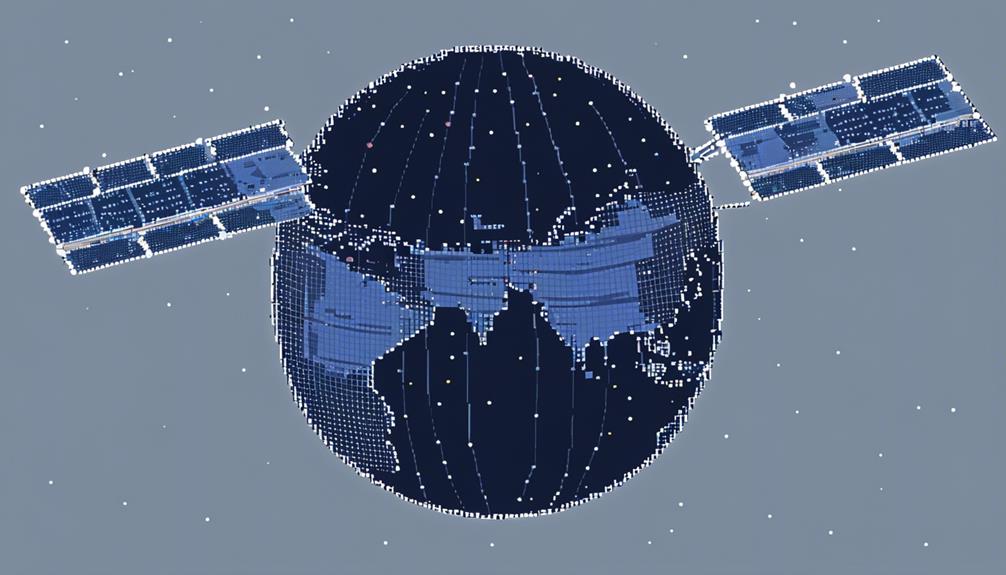The fusion of blockchain technology with satellite networks has ushered in a new era of secure and decentralized communication among satellites. This convergence has not only enabled novel applications such as tokenized value transfers in space but also laid the groundwork for a machine-to-machine economy within the satellite industry. Innovative solutions addressing challenges like memory constraints have emerged, propelling the development of specialized blockchain installations and secure private key generation methods. The utilization of blockchain in satellite networks doesn't just enhance operational transparency and efficiency; it also presents a gateway to peer-to-peer transactions and innovative payment systems, promising significant advancements in the space economy.
Key Takeaways
- Enhances security, privacy, and autonomy in satellite networks.
- Ensures tamper-resistant storage mechanisms for data integrity.
- Revolutionizes network structure through decentralization.
- Optimizes performance with improved data transmission and reduced latency.
Blockchain's Role in Satellite Networks
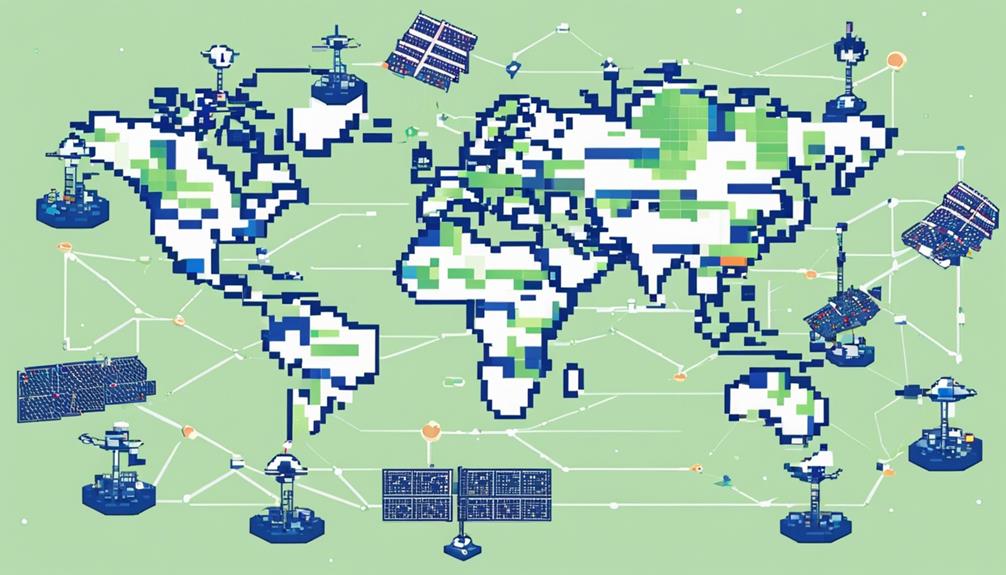
Enhancing security, privacy, and autonomy, blockchain technology plays a critical role in the operations of satellite networks. By integrating blockchain into satellite communication systems, various benefits are realized. Blockchain's decentralized nature ensures that satellite networks are less susceptible to single points of failure, enhancing overall security. This technology also fosters privacy by encrypting satellite communication data, making it more challenging for unauthorized parties to intercept or tamper with sensitive information.
Moreover, in satellite networks, blockchain enables increased autonomy through smart contracts. These self-executing contracts automatically trigger predefined actions when specific conditions are met, reducing the need for manual intervention and enhancing operational efficiency. Additionally, blockchain facilitates streamlined maintenance, upgrades, and resource allocation within satellite networks. It enables transparent and verifiable tracking of network changes, ensuring that all modifications are recorded securely.
Furthermore, the integration of blockchain technology in satellite communication enhances scalability and data integrity. Blockchain's distributed ledger system allows for seamless expansion of satellite networks to accommodate growing demands. This scalability is crucial in ensuring that satellite networks can adapt to evolving requirements efficiently. Additionally, blockchain enhances data integrity by providing a tamper-resistant record of all transactions and communications within the satellite network, fostering trust among network participants.
Securing Satellite Data With Blockchain
Blockchain technology enhances the security of satellite data by providing tamper-resistant storage and transmission mechanisms. By leveraging blockchain in satellite networks, data integrity is ensured through the decentralized and immutable nature of the technology. Smart contracts play a vital role in enhancing the security and integrity of satellite transactions, as they enable automated and secure data exchanges within the network. This eliminates the need for intermediaries, reducing the potential vulnerabilities associated with centralized control in satellite networks.
The integration of blockchain in satellite technology brings forth a new era of secure data management. The immutable nature of blockchain ensures that once data is recorded, it cannot be altered or tampered with, enhancing trust and transparency in satellite data transactions. This not only secures the data but also streamlines processes such as resource allocation and maintenance, leading to more efficient operations within satellite networks.
Decentralizing Satellite Communication Networks

Decentralization revolutionizes the structure of satellite communication networks through the implementation of blockchain technology, fostering peer-to-peer transactions and autonomous contracts. In the space industry, this integration of blockchain technology brings about significant advancements. Smart contracts play a pivotal role in automating various processes within satellite networks. These contracts, powered by blockchain, enhance operational efficiency by enabling automated and tamper-proof agreements to be executed without intermediary involvement.
By leveraging blockchain to decentralize satellite communication networks, transparency and trust are significantly improved. Every transaction or operation conducted within the network is securely recorded on the blockchain, ensuring a high level of data integrity and immutability. This not only simplifies licensing procedures for satellite launches but also guarantees secure and efficient transactions throughout the network.
Moreover, the use of blockchain in the satellite industry goes beyond mere automation; it fundamentally transforms the way satellite networks operate. The transparency and efficiency brought about by blockchain integration pave the way for enhanced collaboration and communication within satellite networks, ultimately leading to a more robust and reliable infrastructure for space-based communications.
Enhancing Satellite Network Efficiency
Blockchain technology plays a vital role in enhancing satellite network efficiency through various mechanisms. Data Transmission Optimization ensures that data is sent and received in the most efficient manner, reducing delays and improving overall network performance. Network Latency Reduction and Security Protocol Implementation further contribute to the streamlined operation of satellite networks, promoting efficiency and reliability in communication processes.
Data Transmission Optimization
Enhancing the efficiency of satellite networks through data transmission optimization involves implementing techniques to maximize bandwidth utilization and minimize latency for improved communication capabilities. In the realm of satellite communication, optimizing data transmission is crucial for enhancing network performance in space-based operations. Techniques such as data compression and protocol optimization play a vital role in reducing latency and improving overall network efficiency. By prioritizing essential information and eliminating redundant data transmission, satellite networks can operate more effectively. Moreover, strategies aimed at minimizing signal interference and ensuring reliable data transfer are paramount in the optimization process. The integration of advanced algorithms and technologies further enhances the efficiency of data transmission, facilitating seamless operations within satellite networks.
Network Latency Reduction
Improving satellite network efficiency through the reduction of network latency is a critical aspect of optimizing data transmission in space-based operations. By leveraging blockchain technology, network latency in satellite communications can be minimized. Blockchain facilitates direct peer-to-peer transactions, eliminating the need for intermediaries and centralized control. This decentralization streamlines data transmission processes, enhancing network efficiency. Smart contracts on blockchain platforms play a vital role in automating and optimizing satellite network operations, leading to significant latency reduction. Through decentralization and the implementation of smart contracts, satellite communication processes become more secure and efficient. This approach ensures improved resource allocation, reducing network congestion, and enabling faster data transfer speeds.
| Decentralization | Network Efficiency | Smart Contracts |
|---|---|---|
| Enhances security | Streamlines processes | Automates operations |
| Minimizes latency issues | Optimizes data transmission | Ensures efficiency |
| Improves resource allocation | Reduces network congestion | Enhances speed |
| Ensures secure operations | Enhances network performance | Optimizes satellite functions |
| Enables direct transactions | Enhances overall efficiency | Automates contract execution |
Security Protocol Implementation
The implementation of robust security protocols in satellite networks is imperative for ensuring data integrity and privacy, thereby enhancing the overall efficiency of satellite communications. By integrating blockchain technology, satellite networks can establish secure communication channels that prevent unauthorized access and data breaches. Blockchain technology plays a crucial role in ensuring efficient resource allocation and streamlined maintenance within satellite networks. The decentralized control offered by blockchain enhances security measures and autonomy in satellite operations. Through the utilization of blockchain security protocols, satellite networks can achieve heightened efficiency, scalability, and trust in transactions, ultimately leading to a more reliable and secure satellite communication environment.
Satellite Position Tracking Using Blockchain
Utilizing blockchain technology in satellite networks, specifically for satellite position tracking, introduces a layer of security and reliability crucial for precise space navigation.
- Enhanced Data Security: By leveraging blockchain technology, satellite position tracking data is stored securely on a decentralized ledger, making it resistant to tampering and ensuring the integrity of the information.
- Global Transparency: The use of blockchain in satellite position tracking provides an open and transparent record of satellite orbital positions globally, allowing for improved coordination and accuracy in space navigation.
- Trust in Data: Distributed ledger technology, as seen in projects like TruSat by ConsenSys Space, enhances trust in the accuracy of satellite orbital data, enabling better decision-making for satellite communication networks.
- Reliability Improvement: Secure storage of satellite positions using blockchain not only enhances data security but also improves the overall reliability of satellite communication networks, leading to more efficient and safe operations in space.
In essence, the integration of blockchain technology in satellite position tracking not only ensures the security and reliability of data but also fosters global cooperation and trust in the information exchanged within satellite networks.
Blockchain for Secure Satellite Transactions
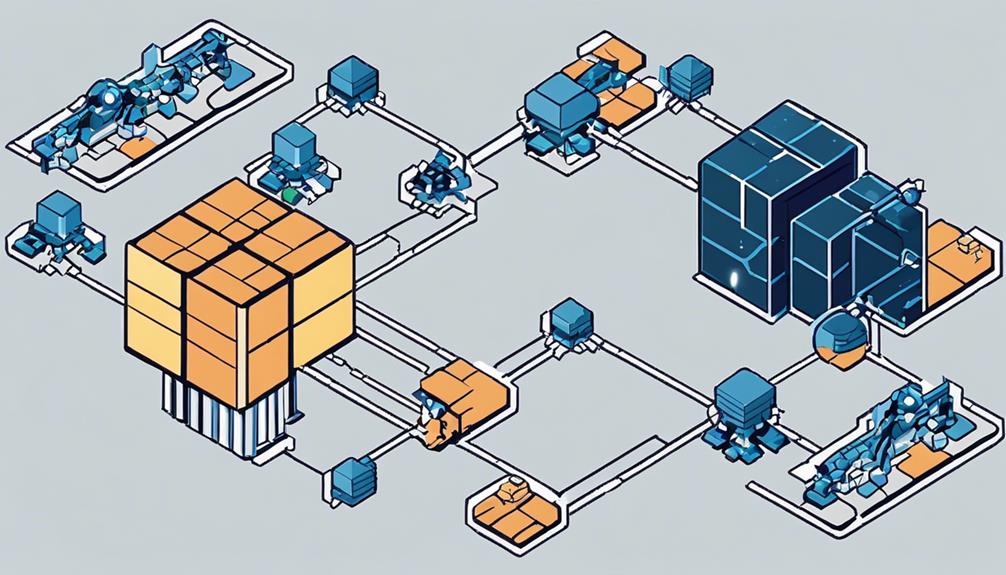
Blockchain technology plays a pivotal role in ensuring the security and integrity of transactions within satellite networks, offering a transparent and tamper-resistant framework for satellite operations. The decentralized nature of blockchain networks provides a robust foundation for secure satellite transactions, reducing the risk of unauthorized access and manipulation of data. Let's delve deeper into how blockchain enhances the security and reliability of satellite systems through the table below:
| Benefits of Blockchain in Satellite Transactions | Description |
|---|---|
| Enhanced Security | Blockchain technology encrypts transactions and stores them across a network of computers, making it extremely difficult for any single entity to compromise the data. |
| Immutability | Once transactions are recorded on the blockchain, they cannot be altered or deleted, ensuring the integrity of satellite transactions. |
| Transparency | Blockchain provides a transparent ledger of transactions that all network participants can view, promoting trust and accountability within satellite systems. |
Data Management in Satellite Networks
Efficient data management practices are integral to the seamless operation of satellite networks. In the realm of satellite networks, data management plays a crucial role in ensuring the secure and transparent handling of information. Here are four key aspects of data management in satellite networks:
- Data Security: Satellite networks deal with vast amounts of sensitive data. Implementing robust security measures is essential to safeguard against cyber threats and unauthorized access. Blockchain technology provides encryption and decentralized storage, enhancing the security of data in satellite networks.
- Data Transparency: Transparency in data management is vital for ensuring accountability and integrity within satellite networks. Blockchain's distributed ledger technology enables all network participants to access a transparent record of transactions, enhancing trust and accountability.
- Data Integrity: Maintaining data integrity is paramount in satellite networks to prevent data corruption or manipulation. Blockchain's immutability ensures that once data is recorded, it cannot be altered, enhancing the reliability and trustworthiness of information.
- Access Control: Managing access to data is crucial in satellite networks to prevent unauthorized usage. Blockchain allows for the implementation of smart contracts that dictate access control policies, ensuring that only authorized parties can interact with specific data sets.
Blockchain Solutions for Satellite Connectivity

In the context of satellite networks, the integration of blockchain solutions revolutionizes connectivity by enabling decentralized and autonomous operations, enhancing security, privacy, and resource allocation. Blockchain technology enhances satellite connectivity by providing decentralized network operations, ensuring that no single point of failure can disrupt the entire network. This distributed approach increases the resilience and robustness of satellite communication systems, crucial for mission-critical operations. Furthermore, blockchain integration improves security and privacy in satellite networks by encrypting data transactions and providing a tamper-proof ledger of activities. This ensures that sensitive information remains secure and that unauthorized access is mitigated, crucial for maintaining the integrity of satellite communications.
| Advantages of Blockchain in Satellite Connectivity | |
|---|---|
| Decentralized Network Operations | Enhanced security and privacy |
| Efficient Resource Allocation | Streamlined maintenance and upgrades |
Efficient resource allocation is facilitated by blockchain in satellite communication networks, optimizing the utilization of bandwidth, power, and other critical resources. By automating the distribution of resources based on predefined protocols, blockchain technology ensures that satellite networks operate at peak efficiency. This streamlined approach not only enhances performance but also reduces operational costs, making satellite connectivity more sustainable in the long run.
Improving Satellite Network Resilience
Improving the resilience of satellite networks entails implementing robust mechanisms to mitigate disruptions and enhance operational continuity in the face of potential challenges. When considering the incorporation of blockchain technology into satellite networks, several key aspects contribute to enhancing network resilience:
- Decentralized Control: Blockchain technology enables decentralized control in satellite networks, reducing the dependency on centralized entities. This decentralized approach minimizes the risk of single points of failure, enhancing the network's ability to withstand disruptions.
- Security and Privacy: The use of blockchain in satellite networks improves security and privacy measures. By employing encryption and consensus mechanisms, blockchain ensures data integrity and protects against unauthorized access, thereby bolstering the overall resilience of the network.
- Efficient Resource Allocation: Blockchain facilitates efficient resource allocation in satellite networks. Through smart contracts and transparent ledger systems, resources such as bandwidth and processing power can be allocated optimally, enhancing network performance and reliability in challenging conditions.
- Resilient Maintenance and Upgrades: Blockchain integration streamlines maintenance and upgrades in satellite networks. By enabling automated processes and immutable records, blockchain reduces downtime, leading to cost savings and improved operational efficiency. This resilience in maintenance contributes to the overall robustness of satellite networks, ensuring continuous service availability.
Blockchain Integration in Satellite Technology

How can blockchain technology be seamlessly integrated into satellite technology to revolutionize communication and operational processes? Blockchain integration in satellite technology plays a pivotal role in enhancing various aspects of space exploration and satellite communication networks. By leveraging blockchain, satellite operations can benefit from increased data integrity, secure communication channels, and streamlined processes. One key application is the use of smart contracts to automate and secure licensing procedures for satellite launches and operations. This not only simplifies the administrative tasks but also ensures transparency and trust among stakeholders. Moreover, blockchain technology can be utilized to track the manufacturing phases of satellites, thereby enhancing supply chain management in the satellite industry.
To provide a clearer overview, the table below outlines some key ways in which blockchain can be integrated into satellite technology:
| Application | Benefits |
|---|---|
| Secure Communication Channels | Ensures encrypted and transparent data transmission between satellites and stations. |
| Streamlined Licensing Processes | Automates and secures licensing procedures for satellite launches and operations. |
| Enhanced Data Integrity in Supply Chain | Tracks manufacturing phases of satellites to enforce rules and improve trust. |
| Improved Space Navigation Accuracy and Safety | Utilizes blockchain for satellite position mapping, enhancing navigation precision. |
Ensuring Trust in Satellite Networks
Ensuring the integrity of satellite networks through blockchain technology establishes a foundational layer of trust for secure and reliable communication among interconnected devices. Leveraging blockchain in satellite networks brings about several key benefits:
- Enhanced Security: Blockchain technology provides a secure and immutable ledger of transactions, ensuring that data exchanges within satellite networks are protected from tampering or unauthorized access.
- Decentralized Architecture: By utilizing blockchain's decentralized nature, satellite networks can reduce the risk of single points of failure. This distributed approach enhances the resilience of the network, making it more robust against potential cyber threats.
- Verification of Data Integrity: Immutable records on the blockchain enable the verification of data authenticity and integrity across satellite networks. This feature is crucial in ensuring that the information transmitted between devices is accurate and has not been compromised.
- Support for Edge Computing: Integrating blockchain technology in satellite networks facilitates edge computing capabilities, allowing for faster processing and analysis of data at the network's edge. This enables more efficient operations and decision-making within the satellite communication ecosystem.
Satellite Network Authentication via Blockchain
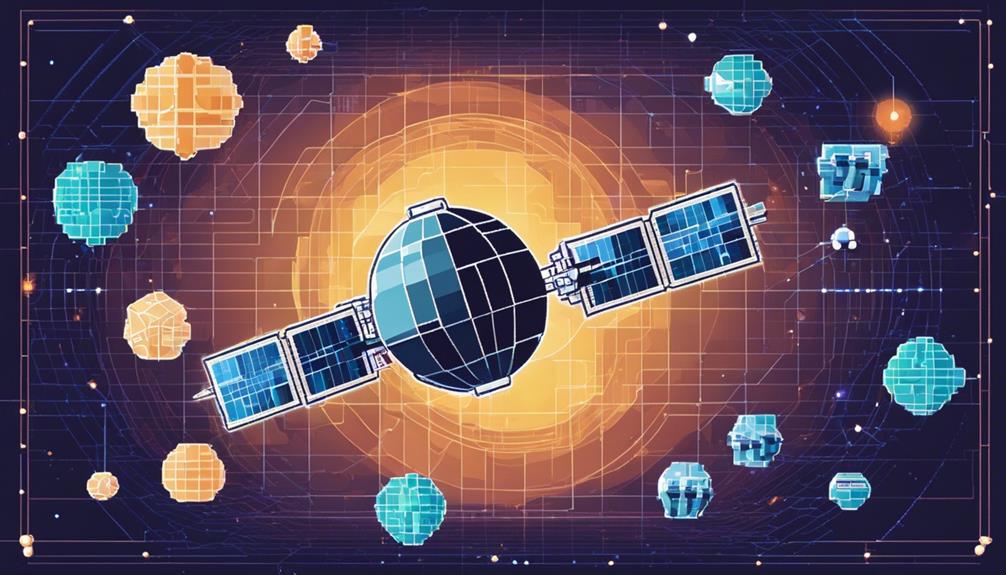
Satellite network authentication through blockchain technology offers a secure framework for verifying communication integrity. By creating immutable authentication records, blockchain ensures the preservation of transactional data with high fidelity. Leveraging a decentralized trust mechanism, satellite networks can establish a transparent and robust authentication process.
Secure Satellite Communication
Blockchain technology offers a decentralized and tamper-resistant authentication mechanism to enhance secure communication within satellite networks. This technology brings a new level of security and reliability to satellite communication systems. Here are four key points highlighting the benefits of utilizing blockchain for secure satellite communication:
- Enhanced Security: Blockchain ensures secure and sovereign transactions, improving overall communication security in satellite networks.
- Automated Transactions: Smart contracts enable automated, secure transactions, enhancing reliability and efficiency in satellite communication networks.
- Exploration of Solutions: Companies like Cloud Constellation and IBM are exploring blockchain-based cloud storage solutions to bolster security in satellite networks.
- Data Integrity: The immutable nature of blockchain technology enhances data integrity, ensuring secure and trustworthy exchanges in satellite communication.
Immutable Authentication Records
Utilizing blockchain technology in satellite networks enables the creation of immutable authentication records, ensuring a tamper-proof and secure method for identity verification. By anchoring authentication processes in blockchain ledgers, satellite networks establish a robust mechanism that deters unauthorized access and enhances cybersecurity measures. The cryptographic hashes embedded within blockchain technology offer a transparent and secure approach to authenticating satellite communications, thereby fostering trust and integrity within network operations. These immutable authentication records not only fortify the verification process but also provide a reliable means of confirming the identity of participants within satellite networks. Leveraging blockchain for authentication purposes elevates the overall security posture of satellite networks, offering a dependable solution for ensuring the legitimacy of network interactions.
Decentralized Trust Mechanism
Implementing a decentralized trust mechanism in satellite networks through blockchain technology enhances the reliability and security of authentication processes.
- Immutable Authentication: Blockchain ensures that once transaction records are verified, they cannot be altered or deleted.
- Secure Communication: Satellite network authentication via blockchain provides a secure channel for transmitting data.
- Transparent Record-Keeping: Blockchain technology enables transparent and tamper-proof documentation of satellite network activities.
- Enhanced Security: Decentralized trust mechanisms in satellite networks reduce vulnerabilities and increase the overall security posture.
Scalability in Satellite Networks With Blockchain
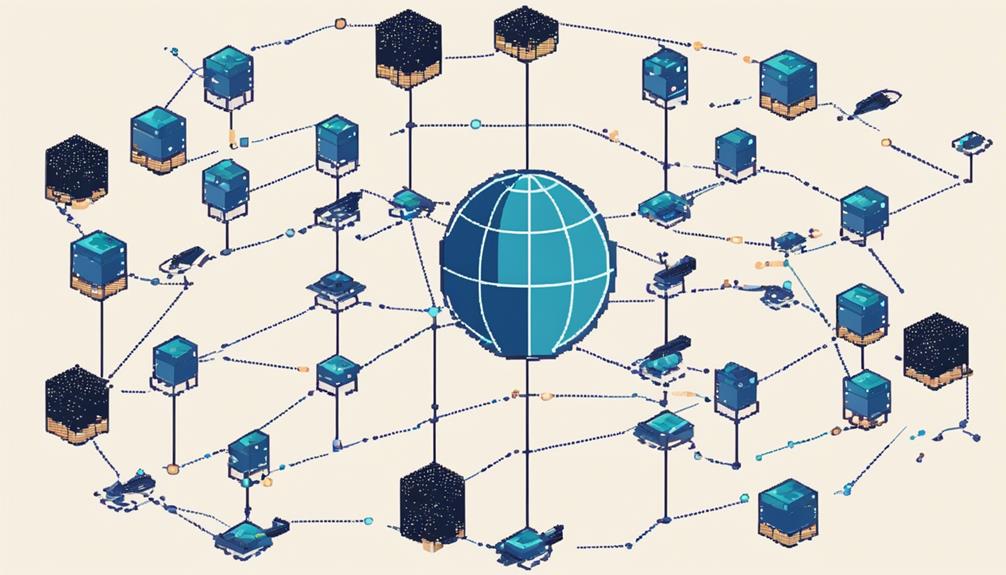
The incorporation of blockchain technology into satellite networks revolutionizes scalability by fostering decentralized and autonomous operational frameworks. By leveraging blockchain technology, satellite networks can achieve enhanced scalability through efficient resource allocation, streamlined maintenance processes, and improved overall network efficiency. Decentralization ensures that decision-making processes are distributed across the network, reducing bottlenecks and enhancing scalability potential. The transparent and secure nature of blockchain platforms also contributes to scalability by providing a reliable foundation for network growth and expansion.
To further illustrate the impact of blockchain technology on scalability in satellite networks, the table below outlines key advantages and considerations:
| Advantages | Considerations | Impact |
|---|---|---|
| Efficient resource allocation | Potential security vulnerabilities | Enhanced scalability potential |
| Streamlined maintenance processes | Integration complexity | Improved network efficiency |
| Transparent and secure platform for growth | Scalability challenges | Facilitated network expansion |
Through these advantages and considerations, it is evident that blockchain technology plays a crucial role in enhancing scalability within satellite networks, paving the way for more efficient and effective operations.
Smart Contracts for Satellite Operations
Smart contracts play a pivotal role in automating and executing predetermined conditions within satellite operations, leveraging blockchain technology to ensure secure and transparent transactions. These digital contracts are transforming satellite networks by enhancing operational efficiency and reliability. Here are four key aspects highlighting the significance of smart contracts for satellite operations:
- Automated Execution: Smart contracts eliminate the need for manual intervention in satellite operations by automatically enforcing predefined conditions. This automation streamlines processes and reduces the potential for human error, thereby increasing the overall efficiency of satellite networks.
- Enhanced Security: By utilizing blockchain technology, smart contracts provide a secure framework for transactions within satellite operations. The immutable nature of blockchain ensures that transactions are tamper-proof and transparent, enhancing trust among network participants and safeguarding sensitive data.
- Cost Reduction: Smart contracts offer cost-saving benefits for satellite operators by eliminating intermediary fees and reducing operational expenses. This efficient method of executing transactions in satellite networks leads to overall cost optimization.
- Streamlined Processes: Through the implementation of smart contracts, satellite operators can streamline various operational procedures, such as data transfer and communication protocols. This optimization of processes enhances the overall performance of satellite networks and facilitates seamless operations.
Blockchain Innovations in Space Communication

Blockchain innovations in space communication revolutionize the way satellite data is secured and transmitted, ensuring the integrity and confidentiality of critical information. These advancements pave the way for decentralized satellite networks, enabling direct peer-to-peer communication among satellites without the need for intermediaries. By leveraging blockchain technology, satellite providers can establish a more efficient and transparent communication ecosystem in space.
Secure Satellite Data
Innovations in space communication have revolutionized the security of satellite data transmission through advanced blockchain technology integration. By leveraging blockchain solutions in satellite networks, the integrity and privacy of data storage and communication in space are significantly enhanced. To elaborate further:
- Enhanced Security: Blockchain technology provides a robust framework for secure satellite data transmission.
- Smart Contracts: Implementation of smart contracts in satellite operations facilitates streamlined and secure data transactions.
- Risk Mitigation: Blockchain integration helps in mitigating cybersecurity risks and prevents unauthorized access to satellite data.
- Efficient Communication: Secure satellite data through blockchain solutions ensures trusted and efficient communication channels in space.
Decentralized Satellite Networks
The integration of decentralized satellite networks with blockchain technology marks a significant advancement in space communication, ensuring secure and transparent transactions among satellites while eliminating the need for intermediaries. This transformative combination ushers in a new era of global connectivity, where satellites can autonomously engage in transactions using smart contracts, facilitated by AI and blockchain technology. By leveraging blockchain's inherent characteristics of immutability and decentralization, these networks can operate efficiently and reliably, enhancing the coordination and exchange of data between satellites. The utilization of blockchain in satellite networks not only promotes trust and security but also paves the way for a machine-to-machine economy in orbit, where seamless interactions and transactions contribute to the scalability and effectiveness of space communication systems.
Frequently Asked Questions
Does NASA Use Blockchain?
Within NASA applications, blockchain technology is not currently widely used. However, the agency is actively exploring blockchain security solutions for various purposes, including enhancing space exploration and securing satellite networks. As Dr. Yelena Yesha's project demonstrates, blockchain has the potential to greatly improve cybersecurity in inter-satellite communication. This focus on innovative security measures aligns with NASA's commitment to advancing technologies that support space missions and protect critical infrastructure.
What Is the Network Technology in Blockchain?
Decentralized consensus is a fundamental aspect of network technology in blockchain. It ensures agreement among multiple parties without the need for a central authority. Cryptographic hashing, a key component, secures data integrity by converting input into a fixed-size string of characters. Smart contracts, self-executing contracts with predefined rules, automate and enforce transactions on blockchain networks. These elements collectively form the foundation for secure, transparent, and tamper-resistant decentralized systems.
How Is Jpmorgan Using Blockchain Technology?
JPMorgan leverages blockchain technology for various applications, fostering financial services innovation. The integration of blockchain within its operations has enabled streamlined processes, enhanced security, and improved transparency. By embracing blockchain, JPMorgan has pioneered new ways to conduct transactions, manage data, and deliver services, setting a benchmark for the industry's digital transformation. The adoption of blockchain underscores JPMorgan's commitment to technological advancement and customer-centric solutions.
What Is Blockchain in Aerospace?
Blockchain in aerospace refers to the integration of decentralized applications for enhancing security measures in space exploration. It leverages cryptographic principles to create immutable records, ensuring transparency and trust in transactions. By utilizing smart contracts, blockchain enables automated and reliable operations in aerospace systems. This technology optimizes resource allocation and maintenance, leading to efficient and scalable operations in satellite communication and data management within the aerospace industry.
